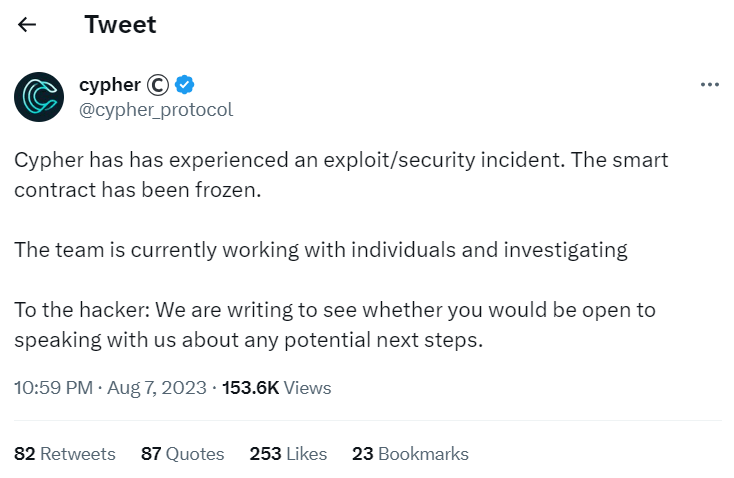
The recent exploit of the Solana-based Cypher Protocol has sent shockwaves through the cryptocurrency community, again shedding light on the security challenges decentralized platforms face. As the protocol’s contracts remain frozen and negotiations with hackers ensue, questions arise about the reliability of smart contracts and the broader implications for the burgeoning Solana ecosystem.

A Fast-Growing Protocol Hit by an Unforeseen Blow
Cypher Protocol has been making significant strides as one of the fastest-growing protocols on the Solana blockchain. Its loyalty program, which rewarded users with points, had attracted a considerable user base. The anticipation of an upcoming airdrop further fueled its popularity. However, the recent exploit has exposed the vulnerability of even the most promising projects in the crypto space.
Frozen Contracts and Desperate Negotiations
In the aftermath of the exploit, Cypher Protocol’s contracts have been frozen. This move was made as contributors and stakeholders scrambled to address the breach and contain its repercussions. Disturbingly, the protocol’s contributors were reportedly attempting to establish contact with the hackers to initiate negotiations for the return of the funds.
While the intention behind such negotiations may be to recover lost assets, this approach raises ethical and legal questions. Engaging with hackers sets a potentially dangerous precedent, as it could incentivize further attacks on vulnerable protocols, perpetuating a cycle of exploitation.
Unforeseen Consequences for Investors
Investors, who had placed their trust and funds into the Cypher Protocol, now find themselves in a precarious situation. The exploit has eroded confidence in the protocol’s security measures and exposed the risks associated with decentralized platforms. This incident underscores the importance of thorough due diligence and cautious investment decisions in cryptocurrency.
Hacker House and Fallout for the Solana Ecosystem
The timing of the exploit, occurring during Cypher’s biannual hacker house, has only exacerbated the situation. The hacker house, an event aimed at fostering collaboration and innovation, has now been marred by this security breach. Such an occurrence raises questions about the security practices of Cypher Protocol and the Solana ecosystem.
Interestingly, the impact of the exploit seems isolated to Cypher Protocol, as fellow Solana trading protocol Marginfi announced that it remained unaffected. This discrepancy points to the need to comprehensively examine the security protocols employed by different projects within the Solana ecosystem.
Reflections on Smart Contract Security
The Cypher Protocol exploit underscores the pressing need for heightened security measures and thorough audits of smart contracts. While the promise of decentralization and transparency is alluring, it must be balanced with robust security mechanisms that can withstand sophisticated attacks. The event must be a stark reminder that even the most innovative platforms are not immune to vulnerabilities and exploits.
Conclusion: A Call for Greater Vigilance
The Cypher Protocol exploit is a cautionary tale for the entire cryptocurrency industry. As the ecosystem evolves and attracts greater attention, the security of its underlying technologies must evolve in tandem. The Solana blockchain and its projects must prioritize rigorous security audits, regular vulnerability assessments, and a proactive approach to addressing potential threats.
While Cypher Protocol’s plight is unfortunate, it should be viewed as an opportunity for the crypto community to reevaluate its security approach. Only through collaborative efforts, stringent protocols, and unwavering commitment to safeguarding users’ assets can the industry foster a sense of trust and credibility that is crucial for its sustained growth and success.
Learn also: SEC’s Swift Action: Unraveling the DEBT Box Cryptocurrency Scam.
Stay with us for more updates!

